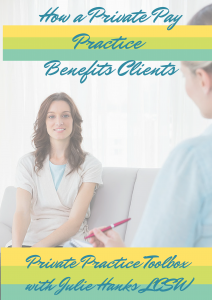 This series highlights the successful private practitioners' journey in private practice so you can learn from their successes and missteps. One of the unexpected benefits of writing this blog is that I've been able to meet and connect with practitioners around the globe. The therapist featured today actually is not on the other side of the world, but is in the same city, and practices only a few blocks away from my practice.
Michelle Lewis, LCSW and I worked together for one consultation and since then, I've been able to watch her really dig in, focus on her niche, and develop a successful practice. She is not only a great practice owner, but is a compassionate person and passionate about her work. Get to know Michelle.
This series highlights the successful private practitioners' journey in private practice so you can learn from their successes and missteps. One of the unexpected benefits of writing this blog is that I've been able to meet and connect with practitioners around the globe. The therapist featured today actually is not on the other side of the world, but is in the same city, and practices only a few blocks away from my practice.
Michelle Lewis, LCSW and I worked together for one consultation and since then, I've been able to watch her really dig in, focus on her niche, and develop a successful practice. She is not only a great practice owner, but is a compassionate person and passionate about her work. Get to know Michelle.
Tell me about your practice…
I own a group practice called Salt Lake Weight Counseling. We specialize in helping clients identify and overcome emotional barriers to weight management. We specifically target emotional eating, food addiction, body image, and patterns of self-sabotage. Working with these issues, we also treat a significant amount of trauma. By addressing the trauma, we are able to help clients heal their relationship with food and end the war with their body.
Why did you decide to open a private practice?
I worked in a residential treatment with adolescents for many years, and the stress really started burning me out, so I took a job in a corporate wellness program through an insurance company. They hired me to work with members to identify emotional barriers related to their health goals. I worked with a lot of clients who struggled with self-sabotage in weight loss. They would yo-yo up and down with the same 10, 20, or 50 pounds over and over again and could not figure out why this happened. I started using my training as an addictions counselor and helped those clients experience success that they had never seen prior. During this time, I had started building a part-time private practice. I wasn't sure if full-time private practice was for me, but as I developed my specialty, I found myself more and more drawn to the idea. Once I took the leap, I really looked forward to my time in my own office and loved the passion that came with my work. I also loved having total control over my schedule and the clients I was working with. Since moving from my full-time corporate job to full-time private practice, the passion and excitement around my work has continued to grow. I love the energy that comes with developing an expertise and working with your ideal client every day!
Clients that therapists find to be the most “difficult” are sometimes the ones who can teach them the most. What have you learned from your toughest clients?
My toughest clients challenge me to be a better therapist. It is easy to get stuck in a rut when you find a formula that works well. When I find clients who struggle to heal, it forces me to try new methods and educate myself on new skills. It actually revives the passion I feel about this work!
What’s your biggest pet peeve about private practice?
Handling money. I think the cliché about therapists being allergic to money is so true! The greatest thing about working for someone else is not having to ask anyone for money. I hate having to follow up with people who have overdue bills, so we started keeping a credit card to avoid the hassle. That has made life so much easier!
How did you discover or develop your practice “niche”?
I am passionate about health and wellness in general. I am an avid cyclist and hiker, so when I found my job through the insurance company's wellness program, I jumped at the chance. It felt like it was what I was made to do. For the first time, I really felt connected to my work in a meaningful way.
What resource (book, website, person) helped you the most when setting up your private practice?
Honestly, you helped me the most, Julie. I set up one consultation session, and you helped me clarify my goals and direct my marketing to my ideal client. My practice really took off after that session.
What has surprised you most about being in private practice?
How rewarding it is! I have had jobs that felt rewarding, but this has taken my work to a whole new level. When I started thinking about private practice, I saw it as a way to work less and make more. This is true, but it goes beyond the financial benefits. This isn't just my career, it is my calling. I think having control over what I do and how I do it has helped me expand my horizons beyond what I thought was possible.
Has your private practice helped you grow professionally?
It forces me to stay on top of my game by constantly exploring new skills and techniques. I am always reading and attending trainings beyond the required number of CEUs. I love learning as much as possible to help my clients heal.
Has it helped you grow personally, too?
It helps me live the life I want. It gives me flexibility to travel, hike, bike, and engage in other activities that keep me balanced and energized.
Being a therapist can be emotionally exhausting. What do you do to care for your own emotions and psychological health?
Spending time with friends, my husband, and my dog are key. When I am having a stressful day, my favorite activity is walking my dog while I listen to an audiobook.
How do you cope with the inevitable stressors involved with being your own boss?
Self-care is key. By taking care of my physical and emotional health consistently, the stressors aren't as powerful. I try to be solution-minded. Instead of getting caught up in the stress, I try to come up with a game plan and then identify potential pitfalls in the future.
What personal strengths have helped you succeed in private practice?
Organizational skills are key! You have to know who's on first at all times! Also, dedication and determination are so important. I feel a dedication to my clients and work tirelessly to help them achieve their goals. I am also determined when it comes to my business. I am consistently looking for ways to improve the work we do.
To learn more about Michelle's practice, visit www.SLWeightCounseling.com.
Get practice tips and blog updates in your inbox. Sign up for the Private Practice Toolbox Newsletter here.
Learn about my private practice consulting
Join my Private Practice Toolbox Facebook group and connect with 3000 therapists around the globe in 2 simple steps: 1) Click request to join the group and 2) Fill out this brief questionnaire before you'll be added to the group.







As healers, we genuinely like to do our work. Guiding clients through the therapy process and seeing them make progress is why we do what we do. But if you're in private practice, you know there's a lot going on in the back end and that it's crucial to run an efficient and organized business.